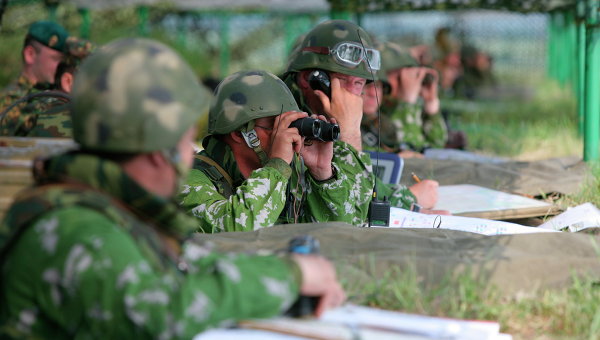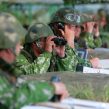
Medvedev Promises Long Term Support for Defense Reform
Publication: Eurasia Daily Monitor Volume: 7 Issue: 213
By:

On November 25, Russian President Dmitry Medvedev offered unequivocal political support for the ongoing defense reform initiated in October 2008. Medvedev’s comments, often contradictory, were made during his visit to observe battalion level exercises at the Gorokhovetskiy training range in Nizhniy Novgorod Region, and later on the same day flanked by the Defense Minister, Anatoliy Serdyukov, and the Chief of the General Staff, Army-General Nikolai Makarov, the president addressed brigade commanders on the progress of defense reform (ITAR-TASS, November 25).
The defense ministry controlled Zvezda TV showed images of the exercise, featuring 1,000 personnel and 100 pieces of hardware; emphasis was placed on unmanned aerial vehicles (UAV’s) particularly the Lastochka, capable of flying at altitudes of up to 3,500 meters (m) and an unidentified UAV that can reach 6,000 m. Serdyukov was shown explaining to Medvedev the plans to transform the range, equipping it with high-tech systems and sensors to convey real time images to the headquarters of the General Staff. Medvedev stated: “I can assure you that there is absolute determination, inflexible determination to complete, to see these reforms through to the end.” Medvedev praised commanders for their active role in conducting military reform, then he made his first puzzling remark of the day: “Many problems remain, but we have a clear cut plan now, about what we should do next” (Interfax, ITAR-TASS, RIA Novosti, Zvezda TV, November 25). The armed forces would appreciate a “clear cut plan” –if it exists.
In the official English translation of the public part of Medvedev’s meeting with brigade commanders, the Russian president opened with some general comments concerning the aims and progress of the reform and stated that the deadline for completing organizational changes is December 2010, while modernization will continue until 2020. Reforming the system of monetary allowances would begin in 2012, freeing servicemen from “non-professional” activities (cooking or chores), allowing greater focus on operational and combat training. Medvedev also said that the modernization will be facilitated by setting the annual defense budget at 2.8 percent of GDP until 2020: a remark that received no critical commentary in the Russian media. Medvedev then argued that the operational-strategic exercises in the past two years (including Zapad 2009 and Vostok 2010) confirmed the “effectiveness” of the organizational changes and that permanent readiness units are “on the whole professional and efficient.” Ignoring that the top brass previously contradicted this claim and General Makarov had admitted that staging such exercises negatively impacted on the reform, Medvedev asked brigade commanders for their views about the “quality of reform” what had proven useful and to identify “problems” (www.kremlin.ru, November 25).
At that point, the English transcription ends on the presidential website, perhaps wisely, and the detail contained in the Russian account of the meeting offers an insight into the public veneer on the “reform” (the sensitive word used by Medvedev) and a level of confusion that two years into the process reveals no coherent overall “plan” for its future (https://news.kremlin.ru/transcripts/9609).
Despite the Russian government and top brass repeatedly stating in recent months that the figure set aside for military modernization until 2020 is 22 trillion rubles ($700.7 billion), Medvedev more than once emphatically stated that the real figure is 21 trillion rubles ($668.8 billion): was this an error, or has 1 trillion rubles already been wiped off the modernization program? Medvedev also told Colonel Yakov Ryazantsev, the commander of the 57th Separate Guards Motorized Rifle Brigade in Eastern military district (MD), that “we agree a lieutenant should receive 50,000 [rubles?] ($1,590), he will receive this money,” although a general is paid 35,000 rubles ($1,115) monthly.
Colonel Valentin Rogalev, the commander of the 74th Motorized Infantry Brigade, in Central MD, Yurga, claimed that Vostok 2010 “aimed to show the readiness to protect Russian interests in the Asia Pacific Region,” and was “highly evaluated,” despite the weaknesses it had revealed, not least that in order to stage the exercise it proved necessary to prevent conscripts being discharged after completing their service. Much of the discussion centered on problems relating to the lack of progress on modernization, which inevitably resulted in the president berating the domestic defense industry. Again repeating the figure of 21 trillion rubles earmarked for the modernization program, Medvedev stated “I hope all of these funds will be spent in a reasonable manner” to purchase “modern samples of military equipment.” Colonel Igor Timofeev, the commander of the 56th Independent Airborne Assault Brigade, South MD, Kamishin, Volgogradskaya oblast, however, lamented the lack of modern helicopters for both troop insertion and fire support, saying it would be “desirable” to receive new platforms (https://news.kremlin.ru/transcripts/9609).
Problems encountered in the reform, were offset by naval commanders offering PR on the performance of the Russian navy in its contribution towards maritime security off the coast of Somalia, as well as the use of a corvette on demining operations in the Gulf of Finland. Captain 1st rank Ildar Akhmerov, a commander in the Russian Pacific Fleet, reported that ships in the fleet now spend more than half their time at sea, a trend that had developed since the reform began.
However, when Serdyukov returned to the theme Medvedev had earlier referred to, by highlighting the value of holding such meetings to receive feedback on the reform, he appeared to signal that everything might be subject to future revision. Such meetings, according to Serdyukov, in future “will allow us to adjust the entire program on military reform” Did Serdyukov really mean the whole agenda might be “adjusted,” or was he simply signaling the need for consensus and full support to breathe life into the reform? Whatever his intention it could not have been lost on his audience that the defense minister has mooted adjusting the “entire program” at some future date (https://news.kremlin.ru/transcripts/9609).
Medvedev’s numerous contradictory or even flawed comments (or his speech writers) may reflect underlying confusion or a sense of crisis within the reform, or equally a clumsy political effort to shore up the process. This should not mask the significance of public presidential support for the durability of the reform, and an admission that it needs a decade of “inflexible determination” to succeed. That support will be welcomed by the top brass, but was Medvedev speaking on behalf of the duumvirate, or hinting that after 2012 he will remain as the supreme commander-in-chief?




